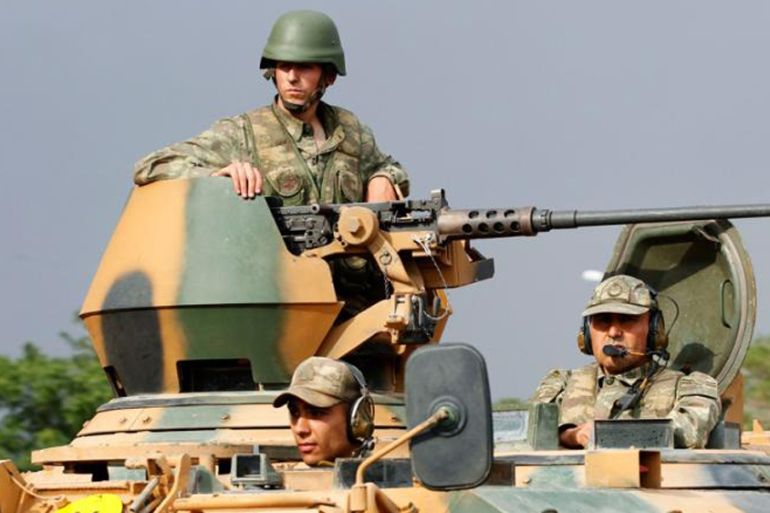Turkish army says PKK fighters killed near Iran border
PKK accused of opening fire in eastern Agri province while pro-Kurdish politician calls for “detailed investigation”.

Five Kurdish fighters have been killed in a clash with Turkish forces in the eastern Agri province, according to a statement by the military.
Turkey called in the back-up force, including reconnaissance planes, after fighters from the Kurdish Workers’ Party (PKK) opened fire and wounded four soldiers in Agri’s Diyadin district near the Iranian border, the military said on its website.
Keep reading
list of 4 itemsTurkey says bombers came from Syria, threatens more cross-border strikes
Turkey launches new strikes on PKK targets in northern Iraq
Turkey says PKK targets in north Iraq destroyed after Ankara suicide attack
The government said the PKK was trying to destabilise the country before a parliamentary election in June.
“Terrorists with rifles opened fire on our forces, who immediately returned fire,” the military said.
“We have received information that five terrorists were killed and one was captured wounded.”
Reports on pro-Kurdish news sites disputed the army’s version of events, saying that the military had launched an operation against a “tree-planting event” led by local politicians.
One such site, DIHA news agency said one “civilian” was killed by the army, naming him as Cezmi Budak, a former local politician. It said another civilian had been wounded and six others detained.
The PKK initially fought for independence for Turkey’s Kurds but later softened its demands to seek greater rights and autonomy.
Turkey and the PKK agreed to a ceasefire two years ago, as part of negotiations to end a three-decade armed campaign that has killed 40,000 people.
However, the fragile peace process has been strained in advance of the election.
Erdogan’s accusation
Turkish President Tayyip Erdogan accused pro-Kurdish politicians of using the PKK as a campaign tactic.
“Twenty-five terrorists are engaged in clashes right now against our soldiers,” he was quoted as saying by the state-run Anatolian news agency.
“A certain political party is trying to gain votes through the actions of this divisive terrorist organisation.”
Erdogan was making an apparent reference to the pro-Kurdish People’s Democratic Party (HDP).
He has invested significant political capital in the peace process that started in 2012 and his authority, to some extent, is linked to its success.
A sweeping majority for the Justice and Development Party (AK Party) he founded in the general elections would allow it to change the constitution and give Erdogan the broader presidential power he seeks.
Yalcin Akdogan, deputy prime minister and a government negotiator in the peace talks, said the attacks were aimed at causing instability ahead of the election.
“Attempts against public order, election safety and the peace of the nation cannot be tolerated,” he said on Twitter.
“To put hopes on guns in an election is a sign of desperation and disrespect of the national will.”
Last month Turkish forces exchanged fire with Kurdish fighters in the southeast, the Turkish military said, despite the peace process.
Ahmet Davutoglu, Turkey’s prime minister, wrote on Twitter “that the army was giving the necessary response to the treacherous attack”.
However, Selahattin Demirtas, the leader of the pro-Kurdish HDP that acts as an intermediary between the government and the PKK, called the clashes “a sad and worrying development”.
“A detailed investigation is needed to find out exactly what happened,” he said in televised comments.